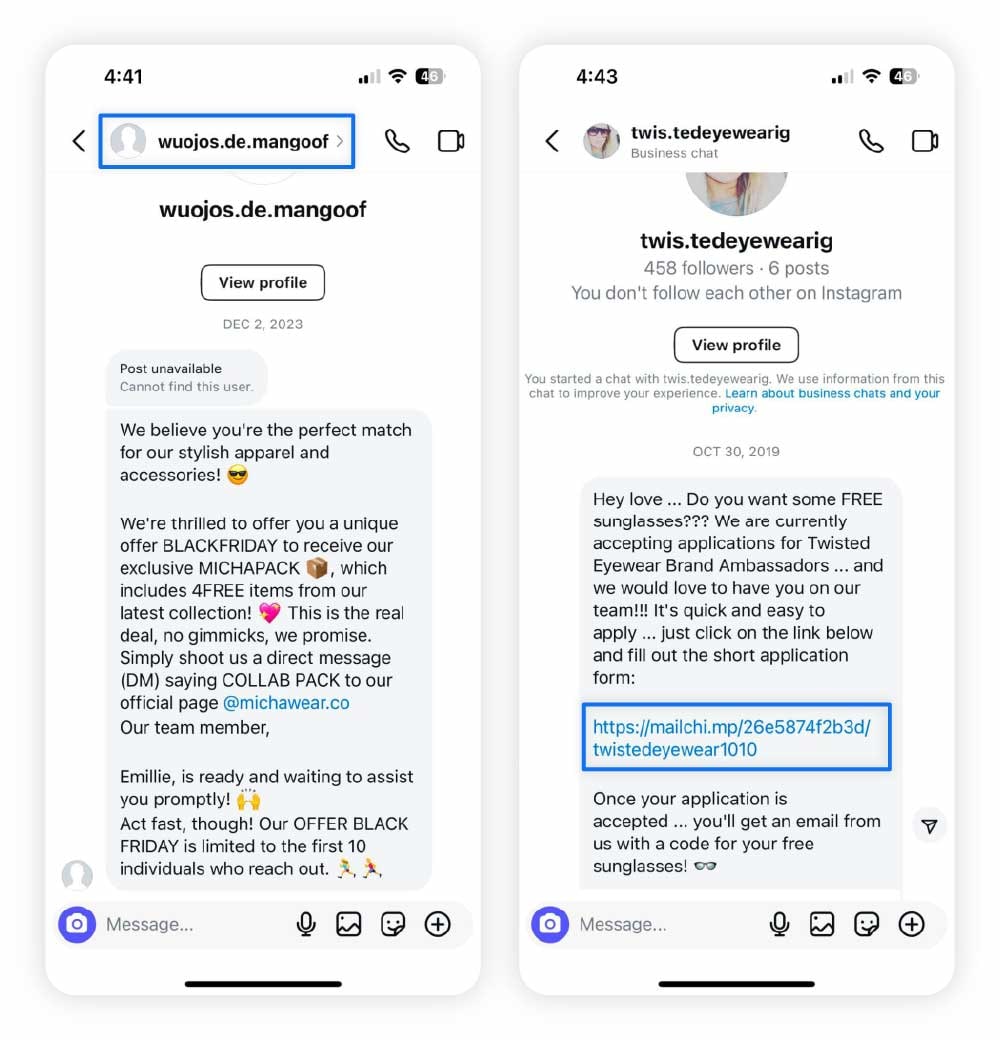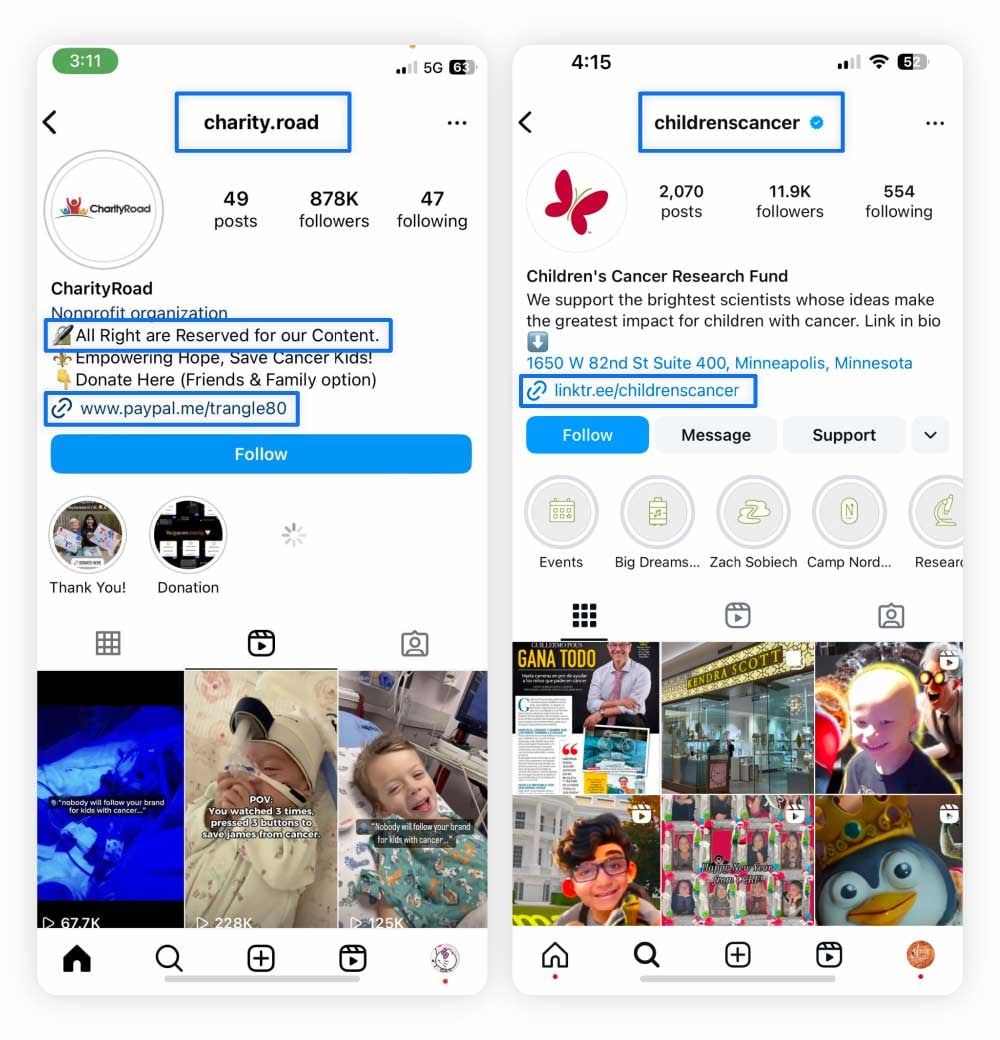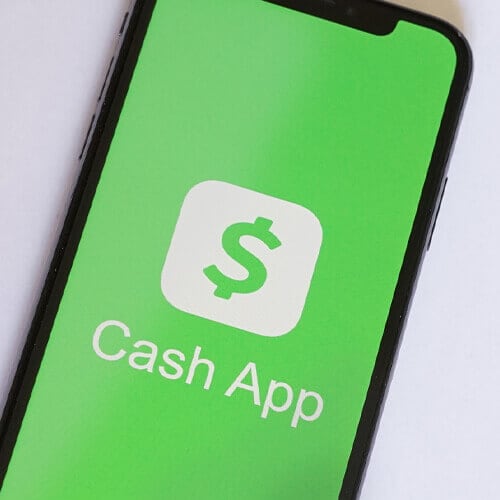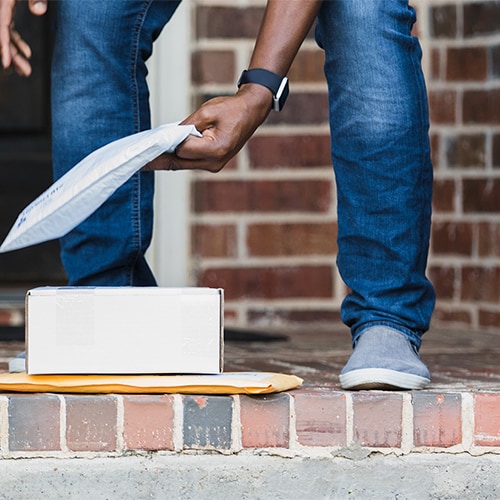What to watch for: Be wary of unverified accounts contacting you about competitions you didn’t enter, especially if they have suspiciously low follower counts or slightly misspelled usernames.
Instagram is one of the most popular social media platforms, with over two billion active users. That popularity makes it a valuable tool for scammers seeking new targets. While Instagram itself is largely safe to use, it’s essential you remain cautious on the app to help protect against scams.
Read on to learn about 13 of the most common Instagram scams and warning signs to watch out for so you can avoid them.
1. Giveaway or lottery scams
Many legitimate brands and influencers host giveaways and lotteries on Instagram. However, scammers can imitate these accounts — creating fake profiles that mimic the real ones, with nearly identical usernames and profile photos — to promote fake giveaways.
A scammer running a fake giveaway or lottery will typically message you directly on Instagram, declaring that you’ve won a prize. However, they’ll first request that you click a link, provide personally identifiable information (PII), or pay a shipping fee to “claim” it. Doing what they ask could leave you vulnerable to malware, identity theft, or financial fraud.
2. Customer support phishing
Instagram phishing scams involve fraudsters posing as customer or technical support representatives. They’ll typically send a message claiming there’s a problem with your account and asking for information like your password so that they can “fix it.” They may create a false sense of urgency by claiming that your account will be banned or deleted unless you take immediate action.
In reality, they’re probably trying to take over your account. If you give them the information they ask for, they’ll try to hijack your account and use it to send spam or scam messages to your followers or gather more information they can use to steal your identity.
What to watch for: Instagram will never send a direct message threatening to ban or delete your account. Be cautious of any messages prompting urgent action or requesting personal details. Contact Instagram directly via the Help Centre if you’re suspicious.
3. Romance scams
In Instagram romance scams, a con artist creates a fake profile and builds a romantic connection with you through direct messages. Their true aim is to trick you into revealing personal information or sending money. These scammers may create elaborate backstories and claim they need financial help. If you fall for it and send them money, they can block you and disappear.
A recent interview with a romance scammer revealed some key tactics used in Instagram dating scams. The interviewee admitted to stealing profile pictures and posing as an engineer, doctor, or member of the military. He would ask his victims to purchase iTunes gift cards, claiming he needed them to buy data for his phone but later selling them on for profit.
These scams are widespread on nearly every social media platform, so watch out for them on other sites like Facebook and Snapchat as well.
What to watch for: If a complete stranger expresses romantic interest in you over Instagram, but refuses to meet in person or on a video call, they’re likely to be a romance scammer.
4. Muse scams
Muse scams are a new variant of the classic fake check scam, primarily found on social media platforms. In this scheme, an Instagram scammer posing as an artist will message you on Instagram claiming they want to use your image as inspiration for an upcoming portrait or mural. They may offer payment, but it’s actually a scam to steal your money.
Here’s how a muse scam works:
- The scammer sends a flattering DM or comment, saying they’d love to use you as their muse.
- They offer to pay you for using your image and send you a check.
- After you deposit the check, they ask you to send back a portion of the money through a payment app, citing an excuse like “covering the cost of art supplies.”
- The check you deposited bounces, leaving you without the money you sent the scammer.
One Reddit user’s example of a muse scam highlights that fraudsters might go to great lengths to create convincing profiles, displaying stolen artwork to make it look like they’re authentic.
What to watch for: Muse scams use flattery and urgency to trick victims, but you should always be cautious when strangers offer unsolicited payments online, especially if they then request a portion of the money be sent back.
5. Fake influencer accounts
Some scammers pose as popular influencers, creating fake profiles designed to look exactly like the ones they’re imitating.
They may offer coaching or promotion services to smaller creators in exchange for a fee, only to disappear once they receive the money. In other cases, they target small businesses, asking for free products in exchange for promotion, but never delivering on their promises.
What to watch for: Be cautious of accounts claiming to be influencers with no verification badge, a low follower count, poor engagement, or a misspelled account name. Check to see if most of their followers seem like bots or spam accounts.
6. Followers for sale
If you’re trying to build your Instagram presence, you may be tempted to buy followers or an already established account. This is in direct violation of Instagram’s terms of service and may result in your account being terminated. It also makes you vulnerable to scammers.
Some scammers sell “followers,” but these are likely to be bot accounts that are banned in time anyway, meaning your investment is pointless. Others hack accounts with lots of followers and then offer them for sale. However, if you pay for one of these accounts, the scammer can block you and leave you with no recourse options.
What to watch for: Any account claiming to sell followers is likely running a scam, as buying followers violates Instagram’s usage policies. Always be wary of offers that promise instant growth.
7. Brand collaboration scams
Also known as sponsorship or brand ambassador scams, brand collaboration scams involve fraudsters impersonating brands and reaching out with fake collaboration offers. If you agree to the partnership, the scammer may request payment for “collaboration fees” or offer you a “free” product to promote but request an excessive shipping fee.
For example, one Reddit user reported a brand offering $2,000 per month plus free products for a partnership. However, they were asked to pay $80 for “shipping expenses.” If they had transferred the money, they likely would have been blocked.
Be particularly wary of this type of scam if you’re just starting out as an influencer. Scammers may prioritize targeting smaller creators who are less familiar with the typical brand collaboration process.
What to watch for: Treat requests to pay a fee for a brand collaboration or cover shipping costs for “free” products as a red flag. Legitimate brands won’t make these requests as part of a collaboration deal.


8. Investment scams
Instagram investment scams involve fraudsters offering paid “financial advice” or access to stock market or cryptocurrency investing opportunities that promise large returns on small investments. If you give the scammer money to invest on your behalf, you’ll likely end up losing your funds and getting no returns.
These are also known as money-flipping scams and are prevalent on practically all social media sites. Some investment scammers may even attempt to hack their victims’ accounts, so they can then target their followers.
What to watch for: Be extremely cautious of anyone promoting investment opportunities on social media, and never allow others to invest your money for you. If an offer seems too good to be true, it probably is.
9. Crypto and NFT scams
Aside from running investment scams involving cryptocurrency “opportunities,” fraudsters may also try to scam non-fungible token (NFT) sellers on Instagram.
Scammers may approach artists with a request to purchase their work, first requiring that the seller lists the NFTs on a marketplace that they control. If you follow their instructions, you may be prompted to pay a fee or forced to give up sensitive personal information as part of the registration process.
What to watch for: Receiving an unsolicited request from an Instagram user to purchase your NFT artwork is an immediate red flag. You should be particularly wary if they request you list it on a platform you don’t recognize or trust.
10. Fake products
Like many other online marketplaces, Instagram’s shopping platform may host scams involving counterfeit products. Fraudsters can use stolen or AI-generated photos to trick buyers into purchasing fake merchandise. If you fall for it and buy the scammer’s products, you may receive a cheap imitation of the item you ordered — or nothing at all.
While Instagram does have a Purchase Protection Policy, it’s important to note that not all purchases qualify. For example, if you use an off-platform, third-party payment platform like Venmo, you won’t be eligible for a refund under the policy.
What to watch for: Unrealistically low prices, unverified seller accounts, and low-quality photos are all common warning signs of potentially fake products, both on Instagram and elsewhere.
11. Fake job listings
Scammers may post fake job listings on Instagram to try and steal your sensitive details or financial information. These job application scams often involve fraudsters impersonating real companies, using stolen logos and photos to create convincing fake profiles that deceive applicants.
If you show interest in the job, the scammer may prompt you to fill out an application form that’s designed to get you to give up personal information like your email address, phone number, or Social Security number. Alternatively, they might request a payment as part of the application process.
What to watch for: Job listings that require you to provide sensitive details or pay to apply are likely to be scams. If you’re interested in a job you found on Instagram, verify it’s real through the company’s website or a trusted job site before applying.
12. Blackmail scams
In blackmail scams, fraudsters will reach out to you via direct message and attempt to build trust, eventually aiming to get information or photos they can use as leverage to get you to pay them money.
After befriending you through conversation, they may encourage you to share intimate photos or personal information, which they’ll then threaten to expose unless you give in to their demands. However, even if you pay what they ask, the scammer may continue demanding more money.
What to watch for: Be cautious of anyone pressuring you to share sensitive details or images via social media messages.
13. Charity scams
Social media platforms like Instagram are often used as tools to fundraise for legitimate good causes, but fraudsters can also take advantage of them to run charity scams. They may create fake profiles designed to imitate real charities and aim to trick you into donating money that will never reach people in need.
For example, one Reddit user flagged an Instagram account with over 800,000 followers that was sharing stolen videos of sick children. The unverified account included a personal PayPal link, falsely claiming donations would support children with cancer.
What to watch for: Avoid donating to untrusted, unverified accounts, and never send money to a charity without first confirming that the payment link is authentic.


How to spot Instagram scammers
While Instagram scams are designed to trick you, often using convincing fake profiles and backstories, there are some common red flags that give scammers away. Look out for the following to help recognize potential scams on Instagram:
- Unverified “official” accounts: Accounts claiming to be the official profile for popular brands or influencers that don’t feature a verified tick are likely to be run by scammers.
- Suspicious account engagement: High follower counts with low engagement on posts or excessive spammy comments that look like they’re made by bots are clear signs of a scam account.
- Missing or generic profile information: Some fraudsters will hastily set up new accounts to run scams, resulting in underdeveloped profiles without a profile picture or bio, for example.
- Strange requests or claims: If someone contacts you out of nowhere and asks for personal information, payment, or to move the conversation off Instagram, there’s a high chance you’re dealing with a scammer.
- Too-good-to-be-true offers: Accounts promising “free” money, complimentary products, once-in-a-lifetime investment opportunities, unrealistic jobs, or high-paying collaborations are likely to be running a scam.
How to protect against scams on Instagram
Learning the most common Instagram scams and knowing how to spot a scammer when you encounter one are both valuable steps that can help keep you safer as you scroll. Use these tips to boost your protection further, helping to keep your personal information and account more secure:
- Enable two-factor authentication (2FA): 2FA requires that you use a code sent to your email address or phone number to log in, adding an extra layer of security that makes it harder for hackers to access your account, even if they get your password.
- Keep personal information private: Don’t share sensitive personal details like your Social Security number or financial information with anyone via social media. Even if you think you know them, their account could be compromised.
- Be cautious with direct messages: Avoid messaging or responding to strangers, even if you have mutual followers. If a conversation ever heads in a suspicious direction, consider blocking the user to help protect yourself from falling for a scam.
- Look out for links: Steer clear of suspicious links that could lead to malicious sites that hack your device or steal your data. If you’re ever unsure of a link, don’t click it and search for the website you’re looking for on Google instead.
- Make your account private: Using Instagram’s built-in account privacy settings can help make it harder for scammers to find your account in the first place, meaning you’re less likely to be targeted by them.
What to do if you get scammed on Instagram
If you’re targeted by a scammer on Instagram, you should act fast to protect your account, finances, and identity. Here’s what to do if you get scammed on Instagram:
- Block the user as soon as you realize they’re a scammer to prevent any further contact.
- Report the scammer to Instagram by tapping the three dots at the top right on their profile and then Report.
- Update your passwords on Instagram and any other potentially compromised accounts, using strong password best practices to boost your account security.
- Alert your bank if you think the scammer may have obtained your financial information, and continue to monitor account activity.
- Protect your credit by considering a credit freeze or fraud alert to help prevent a scammer from opening new accounts in your name, safeguarding your finances.
- File scam reports with the Federal Trade Commission (FTC) and Internet Crime Complaint Center (IC3) to contribute towards a bank of evidence that might help the authorities catch the scammer in the future.
Stay safer on social media
You don’t have to avoid social media altogether to keep yourself safer from scams; use the tips above to spot scams. Then, get LifeLock for an extra layer of protection against identity theft.
With features including Social Security number alerts, notifications of key changes to your credit file, and an automatic data removal tool that scans data broker and people-search sites for your personal information, you’ll be better equipped to catch the warning signs of identity theft and take action if you fall victim.
FAQs
Are Instagram ads scams?
Many Instagram ads are legitimate, but some may be part of scams, promoting counterfeit products or directing users to malicious websites. Act cautiously when you encounter suspicious ads to help protect against scams.
How do you know if you are messaging a scammer on Instagram?
To identify a scammer messaging you on Instagram, watch for red flags like requests for money or sensitive information. Fake Instagram messages also often include spelling and grammatical errors, or suspicious URLs that don’t match the official websites they’re supposed to lead to.
Can people steal your information on Instagram?
Yes, people can attempt to steal your information through various Instagram scams like phishing schemes, fake romantic interest, and fraudulent job listings.
Instagram is a trademark of Instagram LLC.
Editor’s note: Our articles provide educational information. LifeLock offerings may not cover or protect against every type of crime, fraud, or threat we write about.
This article contains
- 1. Giveaway or lottery scams
- 2. Customer support phishing
- 3. Romance scams
- 4. Muse scams
- 5. Fake influencer accounts
- 6. Followers for sale
- 7. Brand collaboration scams
- 8. Investment scams
- 9. Crypto and NFT scams
- 10. Fake products
- 11. Fake job listings
- 12. Blackmail scams
- 13. Charity scams
- How to spot Instagram scammers
- How to protect against scams on Instagram
- What to do if you get scammed on Instagram
- Stay safer on social media
- FAQs
Start your protection,
enroll in minutes.
LifeLock is part of Gen – a global company with a family of trusted brands.
Copyright © 2026 Gen Digital Inc. All rights reserved. Gen trademarks or registered trademarks are property of Gen Digital Inc. or its affiliates. Firefox is a trademark of Mozilla Foundation. Android, Google Chrome, Google Play and the Google Play logo are trademarks of Google, LLC. Mac, iPhone, iPad, Apple and the Apple logo are trademarks of Apple Inc., registered in the U.S. and other countries. App Store is a service mark of Apple Inc. Alexa and all related logos are trademarks of Amazon.com, Inc. or its affiliates. Microsoft and the Window logo are trademarks of Microsoft Corporation in the U.S. and other countries. The Android robot is reproduced or modified from work created and shared by Google and used according to terms described in the Creative Commons 3.0 Attribution License. Other names may be trademarks of their respective owners.








